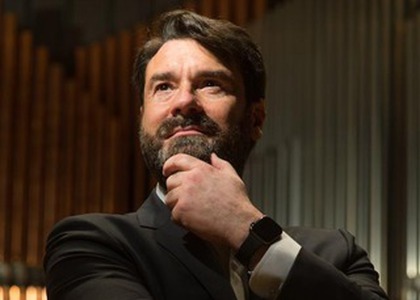> [Archived] Interviews

Interview with composer Dan Popescu
On the 18th of November, theWind Water Earth by Dan Popescu tour will start, featuring violinist Alexandru Tomescu, pianist Sînziana Mircea and cellist Ștefan Cazacu. We find out more details about the recital programme from a conversation with Dan Popescu, composer and initiator of the project.
Mr. Dan Popescu, can you describe, in a few words, the spirit in which the works that the three instrumentalists will perform were written?
The spirit isdifficult to describe in words. The compositions on the CD by the same name, "Wind, Water & Earth", were created over a longer period, both perhaps inspired before the pandemic, and mainly during the pandemic period, and brought to life in 2021 and 2022. This process of inspiration and creation depends on many factors: both the people I have met and my desire to explore a range of thoughts and feelings which are stongly linked to these three elements - earth, water and wind.
Somehow, this album is born out of my phenomenal love and interest for string instruments, the violin and cello - these wonderful instruments that have inspired me throughout my life. And it was also a desire to break out of my musical experience which is very strongly tied to the piano. So, around these two instruments, that inspired me to explore new realms, gravitated the piano.
To which instrument do you attribute each of the three elements - wind, water and earth?
I find it difficult to tell you that a particular instrument represents a particular element. What is clear is that in music there are certain links between the voice of the cello - very close to the human timbre or the sound of the piano keys - the water that is sometimes calm, streaming, sometimes with icy elements, sometimes with flowing or swirling elements within the sound and expression of the piano... The violin can inspire us with a whistle or a smooth caress of a wind... These elements can be found in some or all instruments, depending also on the feelings that the moment of listening to a piece instill in me, or the moment - as it was in my case - of inspiration to compose.
So, it's very difficult to tell you that an element is somehow inspired or represents an instrument, even if in certain moments, especially at the beginning of the creation, I tried to visualize these relationships, discovering in fact, after the three wonderful artists - Alexandru Tomescu, Sînziana Mircea and Ștefan Cazacu -performed these works for the first time, how intertwined these elements are in all music.
When you wrote the works included in the "Wind, Water & Earth" tour, did you write them with the performers of the scores and their technical and interpretative skills already in mind?
I had at one point, perhaps a revelation, if you will. I imagined what it would be like to create this expression of my intention through the bow of a violinist such as Mr. Alexandru Tomescu. It was an incredible moment when I listened to him, in concert, with this new internal ear of mine, with this new intention, and then, that inspiration, that phenomenal transfer of emotions towards my intention to compose for this special voice of the violin under his bow... it was perhaps the moment when this dream popped in mymind. I met the other two musicians prior. For example, Sînziana: I have collaborated with her before on the project "The Heirs of Musical Romania". Ștefan Cazacu... I came to him through recommendations, because I was looking for these partners to round out and make this wonderful team.
What word or phrase would best define your work so far?
If I consider all my creation so far, the most important word would be "curiosity" and... exploring new realms.
"Wind, Water & Earth" is definitely a story about med iscovering these feelings that I have and that I can express through music using these three instruments.
What do you think is the role of a composer in today's society?
As far as a composer as a creator is concerned, it isvery difficult because we have, you see - just like in many other arts and in many other fields throughout mankind - we have a rich history, with many examples, experiences and forms of expression, a very large cultural accumulation, paradigms, dogmas, languages. And then, sometimes it is difficult to find your own language in the context of a tradition, a background, a culture of which you are, after all, a product. We are all the product of the society we have developed in and the history, tradition, culture we have acquired and processed. And to turn all this in formation, this whole social and cultural experience into something new is perhaps the biggest challenge.
Translated by Raluca Ioana Crucerescu,
University of Bucharest, Faculty of Foreign Languages and Literatures, MTTLC, year I
Corrected by Silvia Petrescu














